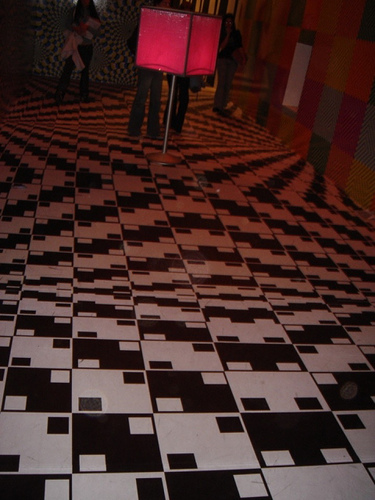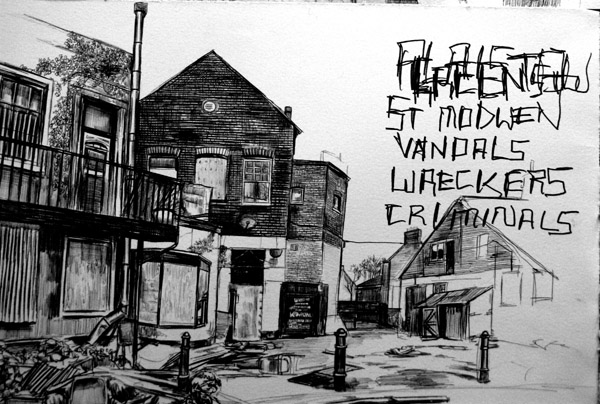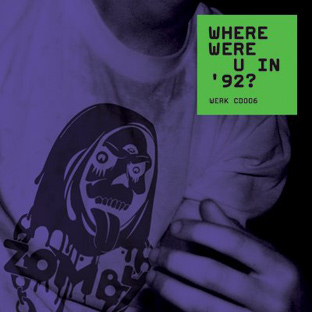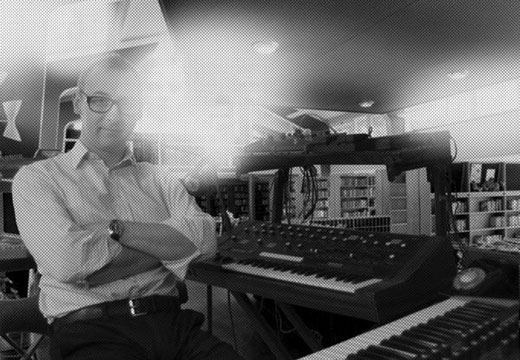February 18, 2009
'a transgeneric mutational agent'

- What is most interesting about Wonky thus far is its trans-generic nature, its relative looseness and inclusiveness to a proper diversity of disparate aesthetics: stretching between Rave, Dubstep, G-Funk, Instrumental Hip Hop, Crunk, Pop, UK Garage, IDM/Electronica, Techno… etc. Moreover it operates in a number of different tempos, (chiefly dubstep’s 138 bpm and hip hop’s slower 90-110bpm) with producers scattered between different continents, and different regimes of consumption (club and home listening). Even further, the very notion of “wonky” itself is a deeply slippery idea. Sometimes it indicates de-quantised drums (as in Flying Lotus, Lukid, and other post Dilla beat-artisans) sometimes pitch-bent synth and bass work (Joker, Starkey, Rustie), sometimes a maddening rush of 8 Bit arpeggios (Zomby, Ikonika, Rustie again). Wonky is not so much a genre unto itself. Instead it operates as a kind of trans-generic mutational agent, spreading seamlessly between bpm species, liquidating textures, distending rhythmical consistency like so much manipulable sonic sticky toffee: All that is solid melts into a new electronic psychedelia, as fluid and mellifluous as the globalised capitalism which spreads it. Wonky in the sense of off-key, out of place, misshapen, breaking through an electronic music environment increasingly characterised by myopic microgenre developments and parodic stylistic affectations, as a set of strategies to be applied to a pre-existing template. In a sense then Wonky detournes pre-existing genres (instrumental hip hop, grime, rave, dubstep etc) corroding the arid grid-like bass kick / snare matrix into something closer to the handmade asymmetrical anti-rhythms of Burial, pushing the shuffled culminating and accelerating sensual textural play towards a surrealist fair ground of Dali-esque percussive affect.
Alex Williams, demonstrating how theory can operate as an intensifier of music. Alex's sumptuous description makes Wonky sound mouthwatering, but ultimately I much prefer his description to the music itself.
Part of my worry is that the problem of formal nostalgia is being sidestepped. There might be not a question of psychological nostalgia in the case of Rustie et al (but even that is difficult to swallow, given the preponderance of videogame analogue in so much Wonky). The problem is that "not dealing explicitly with manipulations or foregroundings of the past (or the processes of memory)" doesn't, of course, mean that you have left the past behind. What you have instead is a music that cleaves to an idea of the 'futuristic', while in fact trading on sounds that are actually now nothing more than well-worn signifiers of the future (ye olde synths and bleeps). (Hauntology faces the failure of the future; Wonky exemplifies it... discuss.) Perhaps Wonky doubles global capitalism all too precisely, in the way that is both about 'mellifluous fluidity' and the minimal manipulation of archaism.
Alex does some ingenious theoretical work to differentiate his defence of Wonky from, on the one hand, standard postmodern accounts of bricolage and, on the other, the D/G-type celebrations of flows and deterritorialization. But it's an open question as to whether the delocalisation brought about by shifts in "technology, lines of communication and influence, and geographical centres" will do anything but gradually lower intensity and innovation levels and increase blandness. Yes, Wonky, like all post-Web 2.0 culture, has moved from the conditions which gave rise to the HCC - but will these new conditions produce something which is anywhere near the equal of HCC? Or will the future just be .... mildly interesting?
London drifts

Me on Laura Oldfield Ford's show....
Not unrelated:
LondonunderLondon
26th February 2009
Gasworks, Vauxhall, London
7 - 8.30pm
Mark Fisher presents his audio-essay LondonunderLondon followed by a conversation with Sukhdev Sandhu and Kodwo Eshun on the cinegeographies and radiophonic terrains of postwar London.
This event is part of the exhibition A Long Time Between Suns by The Otolith Group
This is a free event
Also related:
Also, check out the Quiet Man website, which I should have linked to ages ago...
February 13, 2009
Energy crisis
(I wanna see all the ravers bingeing)
- The libindal investment in The Now, the addictive cultural expectation that what happens in this time is Important ... must not be allowed to blot out the all too real state of affairs... In actuality what we have experienced is merely a blip, perhaps never to be again repeated, 150 or so years of extreme resource binging, the equivalent to an epic amphetamine session. What we are already experiencing is little more than the undoubtedly grim “comedown” of the great deceleration.
Alex Williams blinding, as ever, on the hardcore continuum discussion. I agree with Alex that my (highly compressed) Fact post was in danger of just the incoherence that he points to, namely suggesting BOTH that '“funky, wonky, dubstep, bassline, etc… can all be safely fitted into the HCC model” AND “but they don’t fit the model, and HENCE are indicative of a generational decline”)'.
First off, though, an urgent clarification - when I talked about 'generational resentment' I was referring to writers, not producers. With producers, the problem might be an excessive respect/ reverence, and the greatness of Burial, for instance, was to have given poignant expression to a generation's sense that it had arrived after the goldrush. With certain writers, though, there's an understandable resentment against the idea that innovation in 90s dance music happened at a far more furious rate than this decade. Underlying this is the plainly daft idea that there is an equal amount of intensity and creative energy in any period, and a kind of protective historical chauvinism, a sense that one's own time must be at least the equal of previous eras, together with the old rockist-Romantic, now surely definitively discredited, notion that the young are inherently radical. Yet comparing Funky or Wonky with Jungle, Speed Garage and 2-step is surely no contest. (Not everyone agrees, of course: Dan Hancox argues, bizarrely, that British club music is in the midst of a "revolutionary ferment". Well, Thermordorians always call restoration a continuation of the revolution, but if this is revolution, what would consolidation and entropy look like?)
The 'moral' critique that Alex detects in my post - though I'm not really sure that 'moral' is the right word - is aimed at writers, for allowing slackening rates of innovation to become normalised; or what amounts to the same thing, for succumbing to the general condition of reviewing - as opposed to criticism - where records are assessed on blearily defined hedonic criteria alone, part of the background twitter of tepid cheerleading for late capitalism's minimally different commodities. In any case, I don't think it's a failure of 'modernist will' that has led to the current impasse, and I'm slightly puzzled that Alex attributes that position to me; indeed, my scepticism about Alex's own concept of accelerationism was that will alone would not be sufficient to set it in action. Evidently, a large part of the importance of Simon's discussion of the HCC was the identification of the music's dependence upon "a certain social, technological, and distributive network"; in a sense, the HCC just is that network. So I fully accept that the problems are down to resource depletion rather than a new generation getting slack or losing its appetite for the new. Insofar as these phenomena are in place, they are symptoms of this exhaustion more than its cause. (Of course, they then go on to further reinforce the condition that gave rise to them in the first place, in a vicious spiral characteristic of postmodern reflexive impotence.)

To (attempt to) resolve the incoherence that Alex points to: the problem is that neither Wonky nor Funky have surpassed the continuum, in any sense. The issue of whether they belong to the HCC or not is ultimately secondary to the fact that they haven't managed to leave it behind. That's why, whatever its intentions, whatever its official status as a side-project, Zomby's Where Were U In 92 amounts to a refreshingly honest libidinal confession, an admission that British dance music is still haunted by the HCC. Think about why it's impossible to have imagined a Jungle producer in 92 do Where Were U in 76: it isn't only that 92 had so broken with the whole frame of reference of sixteen years before, it's that the headlong rush into the future precluded such retrospection. But - I reiterate - there's a formal as well as a psychological nostalgia, and, formally, there is very little in Wonky or Funky that couldn't have happened 20 years ago. It simply wasn't possible to say the same about Jungle in 92 because Jungle depended on sounds and techniques which could once there was technology. In this respect, the turn (back) to analogue is significant, and one of the interesting things about Wonky, in fact, is its relationship to nostalgia: it some ways, it could be considered akin to something like Belbury Poly, but with the frame of reference moved forward a decade from Radiophonia to videogame sound. Just to be clear - it's not that this music has no merit, far from it (and I can agree with Alex and Dan Hancox that Joker is the cream of the Wonky crop, his tracks occupying the tipping point where dubstep's loping lugubriousness (d)evolves into a UK crunkstep); it's just that we're dealing with is far slighter than the pulp avant garde scenes of a decade ago. The questions to then address are the ones which Alex discusses so well: namely, how did it come to this? And how are to we respond to it?
What worries me about Dan Hancox's post is that might presage the restoration of pre-HCC critical conditions. Witness the focus on individual auteurship (as opposed to collective scenius) and the celebration of the avoidance of genre, rules and formulae (as opposed to their skillful manipulation). Witness also the disdain for 'monotonous' Bassline, and the appeal to self-evidence in the rhetorical swipe at Donk, as if it is simply unthinkable that Donk might be in any way worthwhile - precisely the same kind of stance that the advocates of 'proper electronic music' back in the day took against hardcore for its supposed barbarism and lack of musicality. The attack on Bassline and Donk also makes me wonder if we're deep into another North/ South divide. Funky sounds worryingly like the sort of dance music that London habitually defaults back to when nothing is happening - the Latin percussion is nice, but it's a very small idea, ten years on from the heyday of 2-step; and beyond the percussion, the rest of the music has a tendency to sound empty rather than spacious, a concession to the minimalist restraint that always come to the fore when club music wants to signify 'sophistication'. A year ago, I really hoped that the success of "Heartbroken" would lead to a revivification of both the dance underground and pop. Perhaps the reason that hasn't happened is that Bassline has never really taken off in a London that is in danger of slipping back into pre-hardcore slumber, governed by the twin attractors of Mixmag-style tasteful hedonism on the one hand, and neo-IDm on the other. (And yes, I know that Rustie comes from Scotland, that isn't the point.)
The most symptomatic thing in Dan's post is his dismissal of 'rude energy' as abstract. Nothing could be more viscerally exhilarating than the energy I'm talking about it - when I hear Bassline, I'm immediately captured and captivated by it, just as I feel the lack of it in Wonky, which is more likely to promote a respectful nod of the head. At the same time, though, the linking of abstraction and energy is interesting. The energy in question can't be directly pointed to as a gross empirical phenonemon, yet it isn't mystical, metaphorical or immaterial; in order to be talked about at all, it demands a measure of abstraction. I guess this was one of the conundra around which the Ccru (which, not coincidentally, was massively fuelled by the HCC or course) was organised. There's a energy crisis at a conceptual, as well as every other, level - how can we talk about this energy in a way that doesn't imply a vitalism? Part of the importance of Alex's interventions is the way he addresses this question by recovering what's most powerful in Deleuze and Guattari, whilst junking all the capital-friendly flowmongering and compulsory positivity. I hope that his prognosis of a 'great deceleration' is too pessimistic... but I fear that most of the evidence supports the thesis...
February 10, 2009
You and Me and The Continuum...
A curtain-raiser for the Liverpool event on Wednesday...Me defending the concept of the hardcore continuum at Fact...
